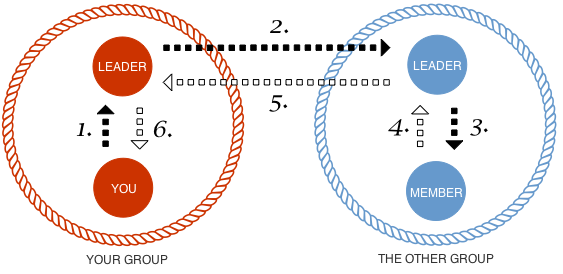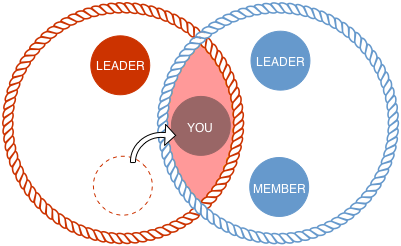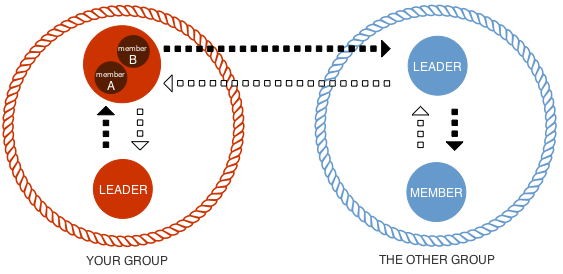Beyond Private Network (BPN)
Summary
Beyond Private Network (BPN) is a free version of Airbnb, and yet guarantees a high degree of trust which Couchsurfing fails to provide.
BPN's protocol is inspired by virtual private network (VPN). "A virtual private network (VPN) allows your company to securely extend its private intranet
over the existing framework of a public network, such as the Internet. With VPN, your company can control network traffic while providing important security
features such as authentication and data privacy" (IBM, n.d.). BPN allows one to safely share their assets with people from new groups as if they
were directly connected to close groups such as family and friends networks. While VPN uses encryption to secure the connection over a public network, BPN harnesses
each group's already existing membership verification and collective identity to materialise a distinct connection protocol which enables a safe transfer of agents over
two discrete groups who don't know each other.



BPN's private network (group) can take any forms so long as it consists of at least three people and falls under the rubric of 'work group'. For example it can be
an artist collective, a university department, a company, a serious sports club and so on. This 'work group' can be defined by whether the group works towards an objective
other than pleasure. A fully functioning work group applies its own membership verification and only trusted agents are allowed to remain in the group. Otherwise they cannot
share assets within a group; for example, the members of the artist collective irational.org share a server computer located in Manchester and
the students from the university department Centre for Cultural Studies, Goldsmiths, University of London share a former public bath building in London.
In order for one to not be kicked out of a group, they need to behave according to its regulations. This rule still applies when someone belonging to a group is interacting
with someone outside the group so long as that person is acting as part of the group. Collective identity is basically represented by this effect, let a person behave as
part of a group at all times so that they will always behave themselves! One may point out its similarity to authoritarian collective responsibility in China:
Collective responsibility was a basic principle of social and political organization during the late imperial period. The baojia system of mutual surveillance,
the immediate origins of which may be traced to the twelfth-century reforms of Wang Anshi, grouped individual households together in decimal units, each which
the system held responsible for the misdeeds of the others (Turner 2014).
However BPN converts the baojia system to enable accelerated mobility for people instead of restricting their movements.
Personnels in BPN will act properly as long as there is a certain degree of trust within each registered group. Therefore it is essential to keep the network off dubious groups.
Registration for BPN
Even though there is no requirement to join BPN other than the minimum number of members, not every work group can become part of BPN; its framework is
designed to exclude those untrue to themselves. In order for a work group to join BPN, the members need to be those who don't mind bringing their organisation into
the realm of life. Unless you truly love your work group, you don't want to associate it with your private life; e.g. on Facebook, normally only those who are
proud of their work groups publicise the information of their workplaces. If you are working for a horrible company, you normally want to cut off any association with
your workplace as soon as your work finishes. In that case, there must be no trust within the group and they don't want to join BPN which fully utilises trust within
a work group.
BPN protocol (for members)
0. search for a property where you want to stay on the BPN map connected to a database.
1. once decided, a request including dates and duration is sent to the leader of YOUR GROUP.
2. the leader of YOUR GROUP sends the request to the leader of THE OTHER GROUP.
3. the leader of THE OTHER GROUP receives the request and forwards it to the owner of the property inside THE OTHER GROUP.
4. the property owner sends back an answer to the leader of THE OTHER GROUP.
5. the leader of THE OTHER GROUP forwards the answer to the leader of YOUR GROUP.
6. the leader of YOUR GROUP forwards the answer you. if accepted, you will receive the contact details of the owner and the address of the property.
7. visit the property with a temiyage* and stay in the house.
*temiyage (visiting gift)
Miyage (蝨溽肇) is the product of a particular local area (the characters are based on meaning rather pronunciation: the first character signifies "earth, soil";
the second, "to produce, to give birth").
Temiyage (謇句悄逕」) is miyage with te, the character for hand; it means miyage carried by hand, and thus a visiting gift offered to the host or hostess (Rupp 2003).
Temiyage also works as an incentive for property holders to provide BPN with their rooms and beds. The more visitors you have, the more temiyage you get!


BPN protocol (for leaders)
When the leader of a group uses BPN, messages need to go through two members randomly selected from the group.
The rest of it is the same as BPN protocol (for members).

Interface (demo)
The interface allows you to search available properties by location and group category. The website will be coded in html, css, Javascript, and php.
By following the instructions and filling forms on the interface, you can accomplish the BPN protocol depicted above.
A visual real-time BPN protocol indicator (like the illustations above) will be built on the website.

Time Schedule
Mid July 2015 - Start recruiting work groups to join BPN and developing the user interface
End of August - Beta version of the interface including the first generation of participants will be publicised
End of October - Further developed platform with documentation of experiences will be updated.
References
Rupp, Katherine, 2003. Gift-giving in Japan: Cash, Connections, Cosmologies. Stanford University Press.
Turner, Karen G., 2014. The Limits of the Rule of Law in China. University of Washington Press.
IBM Knowledge Center, n.d., Virtual Private Networking [Online].
Available at: http://www-01.ibm.com/support/knowledgecenter/ssw_ibm_i_72/rzaja/rzajagetstart.htm?lang=en [accessed: 4th July 2015].






